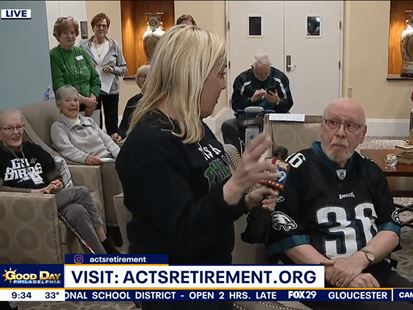In the News
Keep up-to-date on the latest news from around the Acts family.
-
![Dawn4x3]()
Acts Announces New Board Member Dawn Reichard -
![Atvet Milesdavis4x3]()
Azalea Trace Resident Reflects on Vietnam War, 50 Years Later -
![Alf4x3]()
Acts Legacy Foundation Welcomes New Board Member -
![EBP Fagan4x3]()
Helping Hands and Happy Hearts: Meet the Couple Making a Difference -
![Lveneighbors4x3]()
A Lifelong Friendship, a Perfect Home at Lanier Village Estates -
![Bradbreeding4x3]()
Future-Proof Your Retirement: Life Care in an Unpredictable Economy -
![Mthuntsville4x3]()
Huntsville, AL Ranked in Top 10 “Best Place to Retire” -
![New Board Member 4X3 (1)]()
Acts Announces New Board Appointment -
![Actsfitch4x3]()
Acts Earns High Marks for Financial Health -
![Bpeeagles4x3]()
Fox 29 Philly Features Brittany Pointe Estates' Eagles Spirit -
![2025Housingmarket4x3]()
2025 is the Year: Why You Shouldn’t Wait on Moving to a Retirement Community -
![Csc4x3]()
Acts Retirement-Life Communities Appoints New Board Chair
Media Contacts
Campus Fact Sheets
Select a campus location from the drop-down below
to view and download a fact sheet for that campus.
PDF
Acts Retirement
Azalea Trace
Bayleigh Chase
Brittany Pointe Estates
Buckingham's Choice
Cokesbury Village
Country House
Edgewater at Boca Pointe
Fairhaven
Fort Washington Estates
Granite Farms Estates
Gwynedd Estates
Heron Point of Chestertown
Indian River Estates
Lanier Village Estates
Lima Estates
Magnolia Trace
Manor House
Matthews Glen
Mease Life
Normandy Farms Estates
Park Pointe Village
Southampton Estates
Spring House Estates
St. Andrews Estates
The Evergreens
The Terraces at Bonita Springs
Tryon Estates
Westminster Village















